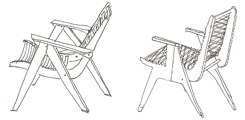A unique and priceless selection of the works of Andy Warhol have been brought out of America for the first time for an exhibition at the Scottish Parliament in Edinburgh. It is also the first time any Warhol works have been exhibited in a Parliament building. The cultural coup came about through negotiations between the Dunfermline based Carnegie UK Trust and the Warhol Museum in Pittsburgh as part of the Trust’s centenary celebrations and as a highlight of the Carnegie Medal of Philanthropy Ceremony held recently in the Parliament.
The link between Warhol and Carnegie is an interesting one. As a child of poor Czech immigrants living in Pittsburgh, Andy Warhol learned to draw at free art classes at Carnegie Tech, later Carnegie Mellon University. When, many years afterwards, the university wanted to honour their benefactor they asked Warhol – by then hugely successful – to create the iconic portrait above.
Warhol’s parents were so poor that his mother would create little flower pot sculptures and sell them door to door for a nickel a time. She made them from pipe cleaners, tissue paper and cans from the Campbell soup she fed her sons every day. It seems that Warhol’s famous soup can paintings were less a comment on mass consumerism and more a vivid childhood memory.
The exhibition is free and runs until 3 November. You can book a slot here.
As part of the exhibition, there is an opportunity to take part in free screenprinting workshops at the Parliament this weekend and next (3 November). Run by the Fife Dunfermline Printmakers, the workshops show how you to create your very own ‘Warhol’ image of the Proclaimers who have given permission for several of their own images to be used. Book your place by calling 0131 348 5454.
Pictured above are artists and printers Jai Llewelyn, Steve Ratomski and Clive Ramage of Fife Dunfermline Printmakers.
Pictured top is ‘Flash – November 1963’, one of a series of works in the exhibition about the assassination John F Kennedy.





No comments!
There are no comments yet, but you can be first to comment this article.